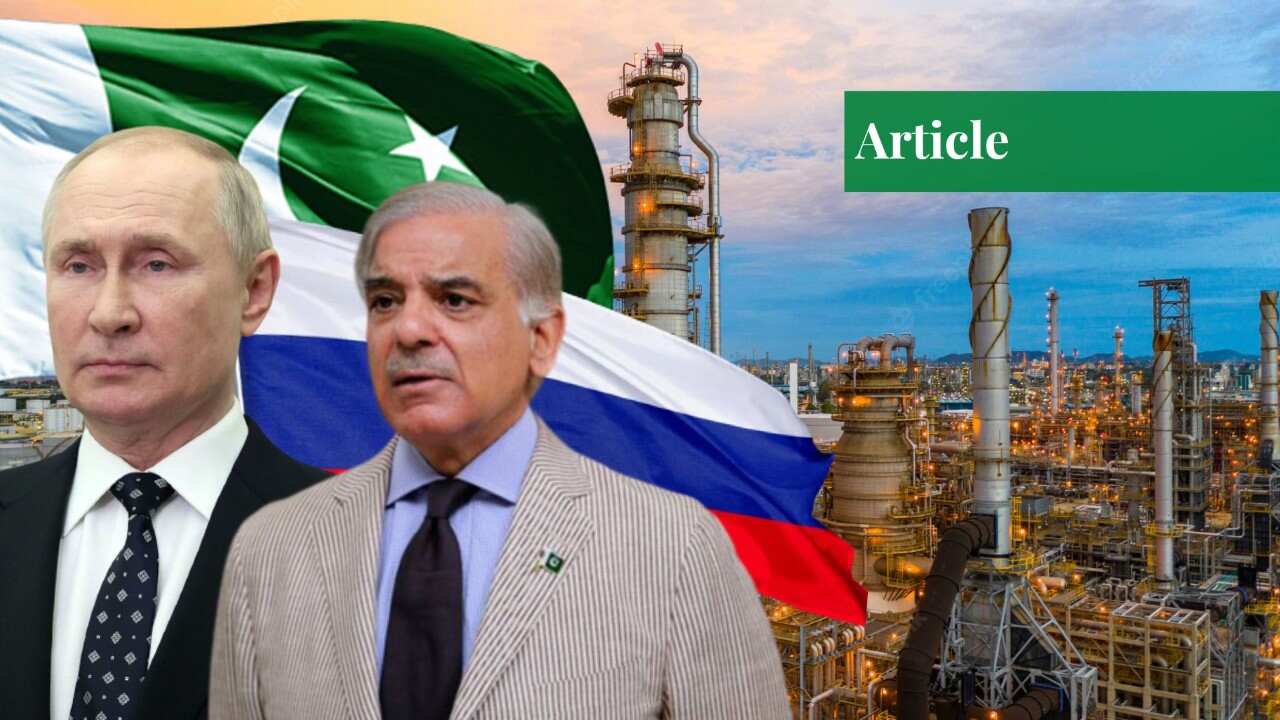Introduction
The inflation rate in Pakistan during the month of October was 26.6%, with foreign reserves currently at $13.721 billion. These numbers will continue to rise and fall, respectively, if Pakistan does not resort to an alternative for energy imports, which account for 25% of the import bill and are the main culprit behind the depletion of foreign reserves.
However, in the month of November, Finance Minister Ishaq Dar announced that a deal with Russia, an OPEC+ member, is underway to gain access to discounted energy imports.
The Deal
Despite the fact that the deal is in its initial phase, the Finance Minister stated that a deal is currently in progress with terms that are similar to India’s. In February 2022, the United States along with its allies exhorted countries to decrease the amount of oil they purchase from Russia and to adopt other alternatives to meet their domestic energy demands in order to punish the Kremlin for the belligerence and aggression it exhibited when attacking Ukraine, a sovereign country.
However, numerous allies including India have failed to adhere to the advice and instead have drastically increased their import of Russian oil. India, in particular, defends its right to maintain economic ties with countries as it is liable for its country’s needs. Thus, importing oil and energy resources is the principal priority, the origin from which the resources are imported is nugatory.
The sanctions imposed on Moscow in tandem with the demand decrease for Russian oil caused the market price of Russian oil to be $30 lower than Brent oil in February 2022. India decided to leverage this price fall and began importing crude oil from Russia in large quantities.
In May, India imported 819,000 barrels per day (bpd). This was a conspicuous increase in crude oil imports as opposed to the 33,000 barrels purchased in the same month a year before. The discount that India received was sufficient for India to deliberate such a sharp increase in the number of barrels imported per day.
However, as Russia broadened its oil market, the discount that India and other countries received was $7-$8 per barrel less than Brent oil. Thus, it is more economical than opting for an alternative that is more expensive and will leave a deeper mark on the foreign reserves.
Similarly, Pakistan is currently negotiating an oil deal with Russia that will allow it to purchase oil at the same rate sold to India. This will be a more feasible option for Pakistan whose gradually depleting foreign reserves currently stand at $13.721 billion. According to last year’s import bill, energy imports accounted for 25% of the entire bill. Thus, one can conjecture that even a slight discount on the energy sector imports will be a viable option for Pakistan.
According to Asad Ullah Kamran, the total amount that Pakistan can potentially save has been calculated to be approximately $3 billion. Consequently, the money saved from purchasing Russian crude oil instead of Brent crude oil can be utilized to service payments on debts, invest in prolific ventures, or for human development programs.
This will be beneficial for the country as money is required to fulfill numerous requests, inter alia, relief to health workers and financial support for flood victims, yet a deficit in the budget prevents governments from completing those obligations and demands.
Geopolitical Consequences
The United States is a significant stakeholder in numerous international organizations that possesses the power to impose sanctions. Generally, an ally or a country having diplomatic ties with the United States will adhere to the caveats and advice provided by the superpower.
India, however, has disobeyed the orders of the US and has prioritized its own internal interests over those of the Western nations. This did not evoke anger or sanctions upon India from the United States as the former is a strategic player in the Indo-Pacific, America’s current interest and priority at the moment in the global sphere.
Pakistan, on the other hand, does not intend to be a part of the United States’ containment of China strategy. Thus, it is possible that the United States may impose sanctions on Pakistan if it continues with the Russian oil deal. Besides sanctions, Pakistan may risk severing ties with Saudi Arabia and the United Arab Emirates which account for 90% of Pakistan’s imports of crude petroleum.
Moreover, recently, Saudi Arabia announced that it anticipates investing $10 billion to build an oil refinery in Gwadar. This project was to materialize in 2015 but did not proceed forward due to the severing of ties between the two countries. Now that the project has once again been announced, efforts should be made to cement the relationship with Saudi Arabia as opposed to undertaking ventures that could prove fatal to the bilateral ties with other Muslim nations.
Limitations
There are several limitations to the proposed deal including jeopardizing international aid/benefits, risking sanctions, and the currency of transactions. Pakistan was recently removed from the Financial Action Task Force (FATF) gray list. However, completing transactions with a sanctioned country via an insecure payment system could cause the international organization to place Pakistan on the list again.
This would be devastating for Pakistan as four years of constant efforts were made to meet the 40 recommendations delineated by FATF. Moreover, the International Monetary Fund (IMF) recently began releasing tranches of the $6 billion bailout program after a stagnant period with no bilateral talks or activity.
Pakistan is in dire need of any financial aid it is able to obtain. If the IMF program is halted due to Pakistan’s oil deal with Russia, this could prove to be fatal to the economic state of affairs. Another limitation is the currency in which oil is to be purchased from the Kremlin. After sanctions were imposed, barring Russia from processing transactions through the SWIFT system, Moscow decided on an alternative approach in which oil would be sold in roubles, the country’s currency.
Therefore, in order for a country to gain access to Russian oil, it must purchase roubles from the international market using its foreign reserves and through a non-sanctioned Russian bank. As stated earlier, this could lead to a domino effect in which Pakistan would be sanctioned by the IMF and FATF. Moreover, Western countries may be skeptical of Pakistan’s motives.
Conclusion
In conclusion, the oil deal with Russia could yield positive results for Pakistan, as it is a more viable and less expensive alternative to the Brent crude oil that Pakistan purchases from Saudi Arabia and the United Arab Emirates. However, if Pakistan decides to shift its focus from the Muslim countries with whom it has been transacting with respect to oil then it could risk severing bilateral relations with those countries.
Additionally, the Financial Action Task Force, International Monetary Fund, and other Western nations could potentially sanction Pakistan for purchasing crude oil from Russia. This would be devastating for a country that is already reeling at the brink of an economic crisis. Thus, Pakistan ought to proceed with the oil deal, if and only if sanctions will not be imposed by international organizations and Western countries.
If you want to submit your articles and/or research papers, please check the Submissions page.
The views and opinions expressed in this article/paper are the author’s own and do not necessarily reflect the editorial position of Paradigm Shift.















